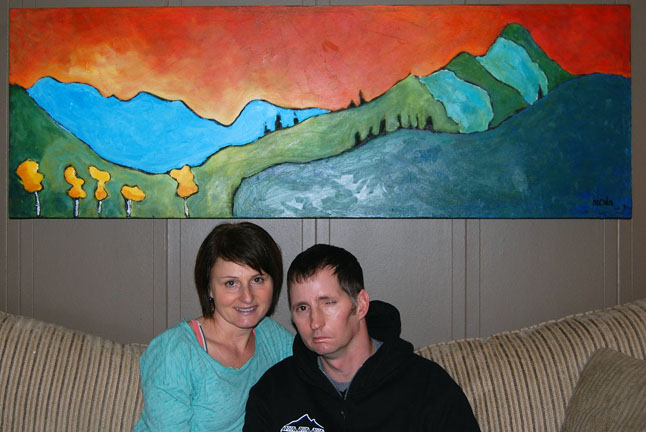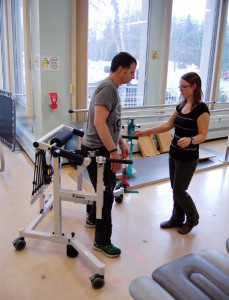
By David F. Rooney
Chris Miller has had a tough year. One year ago he suffered a dangerous stroke and has been gradually recuperating since then.
The stroke that struck his brain stem at 7 am on January 17, 2014, left him uncoordinated and lacking sensation on his right side and paralyzed his left eyelid. His ability to walk is compromised and his fine-motor skills are degraded. He attends regular physiotherapy sessions at Queen Victoria Hospital where therapist Gina Cawthorpe helps him regain his balance, coordination and the confidence he needs to walk freely. Speaking of physiotherapy, he is especially grateful to the Hospital Auxiliary for purchasing some special equipment he uses during his sessions.
“My right side was severely affected,” he said during an interview last week. “I even have to learn how write all over again.”
Recovery from a stroke is not a quick and easy process. When he was felled by the stroke Chris was transferred by ambulance to Salmon Arm where he was assessed and then sent on to Kelowna General Hospital where he spent weeks before he was allowed to return home.
It’s all deeply frustrating but Chris is a resilient guy and is determined to overcome the stroke’s debilitating legacy.
“I try not to get frustrated, but there are days that really suck. I’m very thankful for my wife and daughter.”
The love and gratitude he feels is clear from the tremor in his voice as he talks about the way Joanne Lachance and their young daughter Regan have sustained him.
“I’m also very lucky that I am still me,” he said. “But it’s always in your face.”
As difficult as his situation it could still be much, much worse. The stroke could have left him with aphasia, which is a disorder caused by damage to the parts of the brain that control language. It can make it hard for you to read, write, and even say what you mean to say.
Still, Chris finds he needs all of his determination and courage to remain emotionally and psychologically buoyant. He finds doing things like sit-skiing with Joanne and young Regan deeply satisfying.
“I try to do everything I can do around the house,” he said. “My next challenge is getting back to work.”
Chris has been talking with Work BC about finding a training program that would be suitable for him, however it’s difficult going from being a major contributor to the household finances to someone who is not only now unemployed but also cut off from Employment Insurance.
Joanne works three days a week as a dental hygienist but acknowledges that while “we’re doing okay there’s no room for extras.”
Chris’ courage and attitude are admirable and he never forgets the family and friends whose support is helping smooth the road to recovery. He is very grateful to all of the people and companies who helped his family out by donating to a trust fund for him at the Revelstoke Credit Union last year. Many of those same people are now purchasing a special fat-tired trike he can use to get around outside and even tackle some of the trails he once enjoyed riding.
“That would be something,” he said.
It certainly would be one more small victory in Chris’ efforts to rebuild his life. Go for it, Chris.



